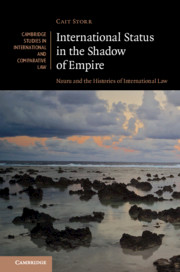(Source: CUP)
Cambridge University Press is
publishing a new book on Nauru’s imperial history and its significance for the
history of international law.
ABOUT THE BOOK
Nauru is often figured as an
anomaly in the international order. This book offers a new account of Nauru's
imperial history and examines its significance to the histories of
international law. Drawing on theories of jurisdiction and bureaucracy, it
reconstructs four shifts in Nauru's status – from German protectorate, to
League of Nations C Mandate, to UN Trust Territory, to sovereign state – as a
means of redescribing the transition from the nineteenth century imperial order
to the twentieth century state system. The book argues that as international
status shifts, imperial form accretes: as Nauru's status shifted, what occurred
at the local level was a gradual process of bureaucratisation. Two conclusions
emerge from this argument. The first is that imperial administration in Nauru
produced the Republic's post-independence 'failures'. The second is that
international recognition of sovereign status is best understood as marking a
beginning, not an end, of the process of decolonisation.
ABOUT THE AUTHOR
Cait Storr, University
of Glasgow
Cait Storr is Chancellor's
Postdoctoral Research Fellow at the University of Technology Sydney. She is an
associate member of the Institute of International Law and the Humanities at
Melbourne Law School, and junior faculty with the Institute of Global Law and
Policy at Harvard Law School. Her doctoral thesis was awarded the University of
Melbourne Chancellor's Prize.
TABLE OF CONTENTS
1. International Status, Imperial
Form: Nauru and the Histories of International Law
2. From Trading Post to
Protectorate, 1888
3. From Protectorate to Colony to
Mandate, 1920
4. From Mandate to Trust
Territory, 1947
5. From Trust Territory to
Sovereign State, 1968
6. After Independence: Sovereign
Status and the Republic of Nauru.
More info here


No comments:
Post a Comment
Note: Only a member of this blog may post a comment.